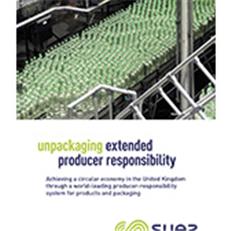Manufacturers are “shirking” their responsibilities for tackling waste – say consumers
This was the view expressed by consumers during qualitative, in-depth, independent new research looking into public attitudes about how recycling and waste disposal should be funded in the United Kingdom in future.
Researchers for social-research specialists, BritainThinks, conducted four day-long deliberative workshops around England asking members of the public a range of questions about waste services, consumption habits, recycling experiences, and producer-responsibility, before testing some of the responses through a national survey of more than 2,000 people.
Most workshop participants felt that manufacturers should take greater responsibility for funding the treatment of waste arising from their products and packaging – while the national survey results showed over half of the population (55%) think manufacturers should be responsible for all of the costs associated with recycling or disposal of the materials they place on the market. The vast majority of the population (84%) agreed, in the survey, that all manufacturers should be obligated and should cover at least some of the cost.
Similarly, around three quarters of the workshop participants felt that manufacturers should pay a deposit when they place products and packaging on the market, and only have it returned on the percentage that is recycled in practice.
However, workshop participants were also highly sceptical that any council cost-savings arising from a transfer of responsibility from councils to manufacturers would be passed on to tax-payers, while producers would conversely be quick to recover their losses by upping the cost of products. Participants also warned that producer-funded systems may make recycling more complex, and inconvenient and could penalise some businesses more than others. The national survey found that 81% of the population consider current recycling systems to be “convenient” – although nearly a quarter (23%) still admit to discarding items they know could have been recycled.
BritainThinks found that consumers want recycling and waste disposal to be convenient, efficient and rewarding – with consumers suggesting they would want incentives from the manufacturers for playing their part in any producer-operated schemes – such as points on loyalty cards for example.
Currently, only larger manufacturers of packaging, as well as manufacturers of electrical items, vehicles and batteries are legally obliged to ensure a certain percentage of the materials they place on the UK market are recycled.
Obligated packaging manufacturers in particular must buy evidence (known as Packaging Recovery Notes) from government-accredited recyclers to demonstrate that they are meeting their specific recycling obligations. The money paid by the manufacturers for this evidence is used to help cover the costs of collecting and sorting waste generated by consumers, but in reality, it only covers between 10 and 15% of the costs, with business and council tax-payers incurring the remaining 90% of costs.
Consumers across the workshops said they were “shocked” by this and felt that packaging producers in particular were “shirking” their responsibilities and were simply “buying compliance”. They also felt the current system was failing to deliver change because producers weren’t incentivised to move towards more sustainable products and packaging.
During the research, participants were asked about their own consumption habits and the majority said they never or rarely consider the environmental impact of the products they buy at the point of purchase. This was echoed by the national survey, which found that sustainability and waste disposal were the two least important factors for consumers (among those tested) when buying goods.
At the workshops, consumers were asked to design their own measurement system and label which could be applied to all products sold in the UK to indicate environmental performance.
The majority of participants favoured “recyclability – how easy it is to recycle a product” over more complex measurements like carbon footprint. There was also a preference towards a simple, three-tier, grading system and the use of “traffic light” colours to indicate good, average and bad performers. Many participants felt that a negative eco-label would erode a brand’s reputation over time and suggested that “a shopping basket full of bad-performing goods would be embarrassing at the check-out”.
According to the national survey results, over half (57%) of the population claim they would routinely check environmental labels and that this would influence their purchasing decisions, and over two-thirds (67%) feel that they would be more likely to purchase brands that were more sustainable than competitors. Although, 60% of people said they would only switch brands if the more sustainable alternative was also cheaper.
CEO of SUEZ recycling and recovery UK, David Palmer-Jones, said: “It’s clear from this new research that consumers want manufacturers to take more financial responsibility for the waste arising from the products and packaging they sell in the UK – and that the current regime is failing to deliver sustainability improvements for some items we all buy and discard every day.
“Consumers are willing to play their part and told us at the workshops that they would even tolerate un-popular cost increases in the short term if it resulted in a better outcome for the environment in the long term – in the same way that we all got used to the smoking ban, the ‘plastic bag tax’ or indeed learning to recycle over the past decade instead of throwing things away.
“From the feedback we received, we can see that increasing the price of un-recyclable or poor-performing goods through producer responsibility obligations maybe isn’t enough on its own to change consumer behaviour, and that sustainability isn’t at the forefront of shoppers’ minds, but that mandatory on-product labelling could empower consumers to vote with their wallets and shun products and packaging that cannot be easily recycled.
“Creating a well-functioning circular economy is not just the responsibility of manufacturers though. It will require the whole value chain, including retailers, councils, government, consumers, waste management companies and re-processors, to come together to deliver an efficient, effective, joined-up system.
“A producer-responsibility regime for the UK must be fair and promote a level playing field for all manufacturers – not just those with the ability to shoulder increased costs. It should also be efficient and minimise the costs passed on to consumers, while rewarding the brands that innovate, adapt and ultimately create less waste through better designed products and packaging.”
Research Director at Britain Thinks, Anastasia Knox, said: “We are delighted to have worked on this research with SUEZ. Consumers across the country engaged enthusiastically with these complex issues and delivered a clear message about the importance of recycling and waste disposal.
“The degree of support for extending producer responsibility beyond the current system was particularly striking. However, it was also clear that to succeed in practice, any new system of producer responsibility will need to be easy to engage with and deliver tangible benefits to consumers.”
Keywords
Report | Unpackaging extended producer responsibility

